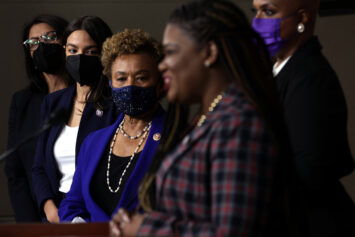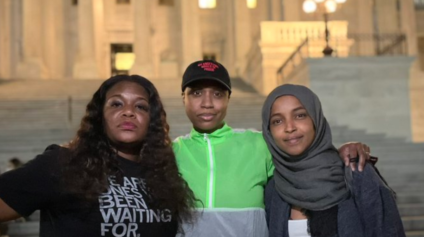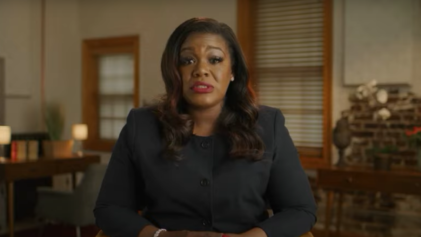Missouri Rep. Cori Bush said during a Sunday appearance on CNN that she can’t support a qualified immunity compromise in a proposed police reform bill.
“Right now, we need to end qualified immunity, period,” Bush told CNN’s Abby Phillip.
Bush’s statement comes as politicians negotiate a federal police accountability bill sponsored by California Rep. Karen Bass on Capitol Hill. The legislation would weaken civil suit protections currently afforded to public officials, namely police officers and tighten when use of force is necessary.
In just the week since former Minneapolis officer Derek Chauvin was convicted for second-degree unintentional murder, second-degree manslaughter and third-degree murder in the death of George Floyd, news of several police-involved shootings, including that of Ma’Khia Bryant, Anthony Thompson Jr., and Andrew Brown Jr., have continued to make national headlines.
Qualified immunity, which became legal doctrine after a ruling by the Supreme Court in 1967, protects public officials like police officers from personal liability following alleged misconduct unless the official has clearly violated an individual’s constitutional rights. The alleged misconduct must be almost exactly previously outlined in a previous court precedent if the victim wants be be able to bring the suit before a jury. In practice, most police officers are indemnified from personal liability for legal claims brought against them for conduct in the line of duty.
A compromise on a nearly year old proposal from South Carolina Republican Sen. Tim Scott would transfer liability away from individual officers to the departments they serve rather than strip officers of qualified immunity.
When asked last week how Democrats were responding to his proposal, Scott said, “You’ll have to ask them how they feel about it but they have been as responsive in this recent conversation than they have ever been, in my opinion.” He said talks are “on the verge of wrapping soon.”
But Bush, the first Black congresswoman to serve Missouri, said she won’t support the compromise.
“We compromise on so much,” Bush said. “We compromise, we die… I did not come to Congress to compromise on what could keep us alive because it holds police officers specifically accountable because, the thing is this, if you don’t hurt people, if you don’t kill people, if you are just and fair in your work then do you need qualified immunity anyway?”
Bush, who is also a registered nurse, pointed out that similar protections don’t exist for nurses and other workers who are “just trying to help people.”
Bush confirmed, “No, I will not compromise on that. We need to end qualified immunity.”
The St. Louis native added that her hometown has consistently ranked “number one for police murder in the country per capita,” adding “The people did not send me here to save their lives by falling down on the one thing we needed the most, no.”
South Carolina Republican Sen. Lindsey Graham also weighed-in on the debate surrounding police accountability on Sunday, and criticized the proposal to weaken qualified immunity for police officers.
“Qualified immunity is a problem,” Graham said. “It’s a pretty simple solution: Don’t sue the police officer, sue the department.”
Graham told Chris Wallace on Fox News Sunday, that the election of former President Barack Obama and Vice President Kamala Harris prove that “America is not racist,” saying: “We just elected a two-term African-American president … the vice president is of African-American, Indian descent.”
Bass said she disagreed with Republicans’ proposal to preserve qualified immunity for individual police officers, but said she would compromise on the issue if members of the GOP “can show us another way” to hold individual officers responsible for their actions.
Bass wants a focus to also be on establishing national standards across the thousands of police stations in the nation.
“We have 18,000 police departments and no national standards, which is why you see some practices legal in some areas and illegal in other areas,” Bass said on ABC’s “This Week,” adding: “We know that officers are trained to shoot to kill, but maybe much more emphasis could be placed on de-escalation — why some incidences result in people being killed. Maybe there were other ways to respond other than firing.”


